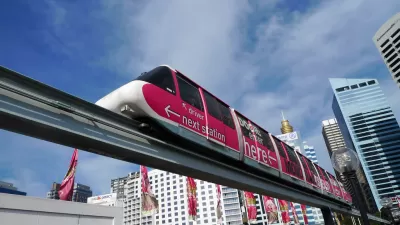Is the isolation of personal rapid transit truly viable for mass transit?
As the Shweeb takes Google's Project 10^100 prize in public transport innovation, Erica Schlaikjer of TheCityFix asks: "How much more isolated can we get, suspended in enclosed pods, watching vibrant street life whizzing by?"
She continues: "While the idea of adapting "a thrilling and innovative riding experience" to an urban setting is exciting (the Agroventures Park Shweeb ride can reach "up to 45 kilometers per hour and 60-degree swings on the bends,") it seems wasteful to seriously consider this technology as an "innovation" in public transportation, when there are so many other low-hanging-fruit solutions to improve the way people move around in cities.
Just considering the dollar cost per kilometer of infrastructure, the Shweeb seems less financially responsible than simply building more (or better) bike lanes, sidewalks or bus corridors -- all of which are relatively low-cost. Yes, the Shweeb would be cheaper than building a new metro or light rail system, but it still requires significant infrastructure to move just one person (or up to four people) at a time. Why not fund high-quality articulated buses that can transport a couple hundred passengers? If existing bus systems are costly, why not figure out ways to make them more economical, rather than creating a new type of mass transit? Or, if last-mile connectivity is the problem, why not invest in something like city-wide, high-tech, well-branded bike-sharing systems?"
Thanks to Garrett Bradford
FULL STORY: Google Awards $1 Million to Shweeb

Alabama: Trump Terminates Settlements for Black Communities Harmed By Raw Sewage
Trump deemed the landmark civil rights agreement “illegal DEI and environmental justice policy.”

Study: Maui’s Plan to Convert Vacation Rentals to Long-Term Housing Could Cause Nearly $1 Billion Economic Loss
The plan would reduce visitor accommodation by 25% resulting in 1,900 jobs lost.

Planetizen Federal Action Tracker
A weekly monitor of how Trump’s orders and actions are impacting planners and planning in America.

Wind Energy on the Rise Despite Federal Policy Reversal
The Trump administration is revoking federal support for renewable energy, but demand for new projects continues unabated.

Passengers Flock to Caltrain After Electrification
The new electric trains are running faster and more reliably, leading to strong ridership growth on the Bay Area rail system.

Texas Churches Rally Behind ‘Yes in God’s Back Yard’ Legislation
Religious leaders want the state to reduce zoning regulations to streamline leasing church-owned land to housing developers.
Urban Design for Planners 1: Software Tools
This six-course series explores essential urban design concepts using open source software and equips planners with the tools they need to participate fully in the urban design process.
Planning for Universal Design
Learn the tools for implementing Universal Design in planning regulations.
Caltrans
Smith Gee Studio
Institute for Housing and Urban Development Studies (IHS)
City of Grandview
Harvard GSD Executive Education
Toledo-Lucas County Plan Commissions
Salt Lake City
NYU Wagner Graduate School of Public Service




























